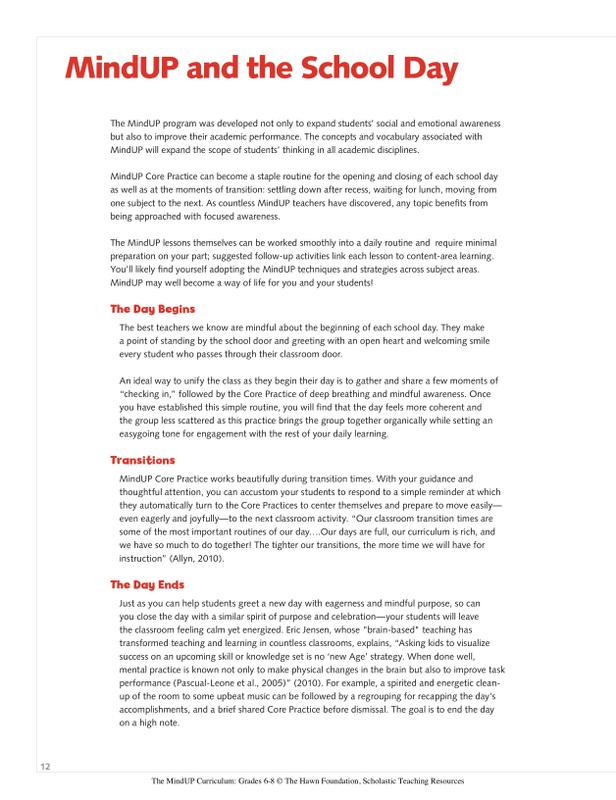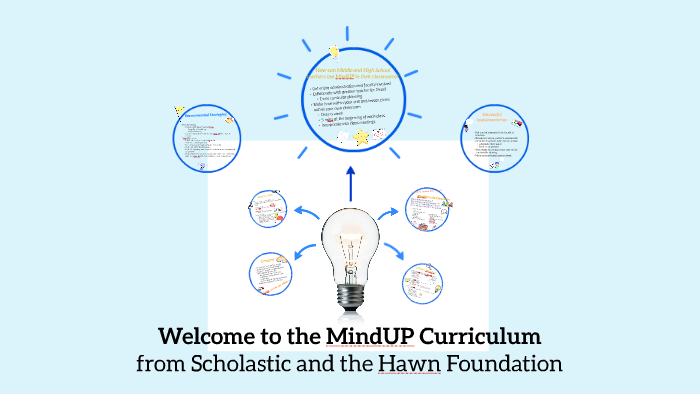

The 5 Keys to Success are embedded within the program, which aligns with the Australian National Curriculum. You Can Do It! EducationĪ social and emotional learning program that provides our students with the necessary skills and attitudes to increase their positivity, achievement and wellbeing.
Mindup health curriculum how to#
Social skills and socially acceptable behaviours are taught through a process similarly as learning how to read or solve a mathematical problem. Positive feedback is encouraged regularly to students, endeavoring to teach them how to behave appropriately.

SWPBISĪ whole school approach towards creating a culture which encourages effective learning through the development of a positive, calm and welcoming environment. Behaviour management, using restorical practices is implemented through the School Wide Positive Behaviour Intervention and Support initiative (SWPBIS). The appointment of a school Chaplain and the engagement of mentors encourage and guide students who may benefit from a supporting and mentoring relationship. Pastoral care is common practice to support our students in all facets of their development and wellbeing. Positive character development is taught through the Social, Emotional programs, ‘You Can Do It’, Zones of Regulation and ’MindUP’. A high standard of courtesy, dress and integrity is expected and reinforced. Students are encouraged to be independent, valuing themselves and others. ‘ Jump Rope for Heart’ program encourages a positive attitude towards exercise, healthy eating and heart health.

‘Rethink your Drink’ addresses the consumption of sugar sweetened beverages and other sugary foods. The school also operates a Canteen, and supports ‘ Crunch & Sip’, promoting healthy eating through the ‘ Traffic Light System’. Ĭonclusion: The findings of this study demonstrated the need for MindUp curriculum to emphasize well-being enhancement.T In addition, students who receive mindfulness training based on their personality traits, particularly agreeableness and extraversion, can expect more significant outcomes.Community Health provide regular services including health appraisals for kindergarten and pre-primary children. Results: According to the findings, there is a difference in the mean of well-being, agreeableness, and extraversion variables in the experimental and control groups, and the MindUP curriculum improved students' well-being, agreeableness, and extraversion in the intervention group (p≤0/05).

The final data analysis was performed by MANCOVA using SPSS with 66 participants. The MindUp curriculum was then presented in 15 sessions over the course of six months to the experimental group, while the control group did not receive any training. Randomly, 35 individuals were assigned to the intervention group and 35 individuals were assigned to the control group.They answered Health-related Quality of Life Index (KIDSCREEN-10) (Erhart et al., 2009) and Big Five Questionnaire for Children and Adolescents (BFQ-C) (Markos & Kokkinos, 2017). Method: This study employed an experimental approach with a pre-test and post-test design and a control group.The study population included all elementary school girl students in grades 3-5 in Kerman in 2020-2021. Therefore, the aim of this study is to investigate the effect of MindUp curriculum on well-being and Big Five personality traits, based on Maloney et al. Given that individual differences can play an important role in the acceptance and effectiveness of mindfulness training, understanding the role of Big Five personality traits in responding to mindfulness interventions seems necessary. Background and Purpose: Few studies have examined the role of mindfulness in well-being in children.


 0 kommentar(er)
0 kommentar(er)
